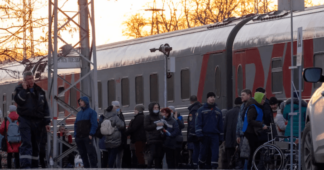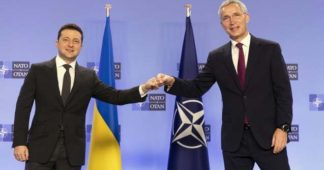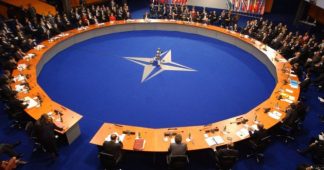Peace Instead of NATO
Speech by Sevim Dagdelen, Member of the German Bundestag at
„No to NATO – Yes to Peace“-rally in Washington DC on July 7th 2024.
As NATO marks its 75th anniversary on the eve of its Washington summit, three of its great myths are unravelling.
First myth: That NATO is a defensive alliance abiding by international law.
In reality, over the last quarter century, NATO has waged unprovoked, illegal wars of aggression against Yugoslavia and Libya; and the United States, the leader of the alliance, invaded and occupied Iraq, in a catastrophic adventure – to name three notorious examples.
Second myth: That NATO stands for democracy and the rule of law.
The reality is that NATO has never had a problem with counting military dictatorships or fascist regimes among its members. Portugal, one of NATO’s founding members, murdered thousands of Africans in its colonial wars and tortured hundreds to death in concentration camps. That was never a problem for this particular collective of shared values, just as Erdoğan’s Türkiye, with its support for jihadists terrorist groups in Syria, poses no particular ethical problem for it today.
Third myth: That NATO is a community of shared values and stands for human rights.
In reality the wars conducted by the United States and its Allies over the last 20 years alone have killed four and a half million people, as calculated by researchers at the esteemed Brown University. The torture and detention camp at Guantánamo Bay Naval Base is still in operation to this day. The journalist Julian Assange was tormented nearly to death for 14 years because he had published evidence of US war crimes. Benjamin Netanyahu’s far-right government continues to receive American and European support in the form of arms deliveries for its onslaught against Gaza, which cannot credibly be justified by recourse to the right of self-defense.
At its Washington summit, NATO intends to make its strategy of escalation and expansion global. Ever more weapons deliveries to Ukraine are planned; the danger of direct involvement in the war is rising; and the NATO-isation of Asia is now getting underway officially.
With its bilateral agreements, NATO is now seeking to expand its hegemony in Asia and to pit itself against China; and this will be preceded by further skirmishes in a self-destructive trade war – all instances of a reckless strategy in urgent need of being shut down.
If you want to know what character NATO has, you only have to look at the fact that NATO unconditionally supports the far-right government of Netanyahu in Israel.
If you want to know what character NATO has, you only have to look at how NATO Stoltenberg torpedoes every initiative for peace in Brussels, and also do Washington and Berlin. The plan is escalation nor negotiations for peace! We say: We need to Stop the killings in Ukraine. Ceasefire now!
And we also say: we need to stop the killings in Gaza! Ceasefire now!
What is the role of Germany in this ongoing war in Gaza?
In fact, Germany is the second most important arms supplier for Israel after the USA. From 2019 to 2023, 30 percent of weapons came from Germany. In 2023, the figure was 47 percent while the USA supplied 53 percent. I think that is irresponsible and a shame to send weapons to an ongoing war.
The majority of the German population now no longer wishes to follow Berlin in its mindless escalation, and it likewise stands opposed to granting Ukraine NATO membership, and to funnelling endless sums of money to the corrupt, undemocratic regime in Kyiv.
It is completely irresponsible and insane to hold on to Ukraine’s NATO membership. A majority in Germany rejects this accession. 55 percent in the whole of Germany and 70 percent in eastern Germany reject it. Our governments are doing politics against the majority of the population.
It is an embarrassment and a travesty that the current German Government, like no other before it, carries out Washington’s commands at a moment’s notice, repeatedly, continuously – and shamefully, with its belligerence – puts at grave risk the well-being of the people who elected it.
We need peace instead of NATO.
We need, at long last, to stand up for democratic and popular sovereignty, and to reject the indignity of being a vassal to Washington, which is just about all we’ve gotten from the ruling coalition in Berlin.
Global NATO: Expansion and Escalation
Keynote speech by Sevim Dagdelen, Member of the German Bundestag at
„No to Nato – Yes to Peace“-Summit in Washington DC July 6th 2024
Just in time for its 75th anniversary, NATO has dropped its mask. And the NATO summit in Washington is one particularly illuminating moment in this revelation. The history of the Enlightenment teaches us never to accept a person’s or an organization’s self-image at face value. So do the early sources of Enlightenment ideas in ancient Greece. The Greeks already possessed that insight. Inscribed above the Temple of Apollo was the maxim: Know thyself.
If we take that injunction not lightly as a gentle reminder of the limits of human thought but also as meaning what the pre-Socratic Greek philosopher Heraclis insisted – that “It belongs to all men to know themselves and think well” – then we must regard self-knowledge as an essential human quality, which perhaps also ought to apply to our organizations.
With NATO, however, it seems to be exactly the reverse. For NATO, denial of its true nature is part of the essence of the organization. Or to put it another way, an almost meditative immersion in its own self-image is part of the essence of the military alliance. It is all the more astonishing, then, that Western media are so often content to reflect a thousand iterations of this self-image back to the public, without question and without pausing to consider whether the image adequately represents reality.
In fact, 75 years of NATO is equivalent to 75 years of denial, albeit with a dramatic expansion of scale and scope in recent years.
This is so in part because the three great myths of NATO are now fading.
First is the central myth of a NATO organized as a defense community committed to international law: a NATO that is a community of constitutional states upholding the law, allowing international law to rule its actions so that it exists for no other purpose but to defend the territory of its members.
Yet if we interrogate NATO’s actual policies, what do we find?
In 1999, NATO itself conducted a war of aggression, in breach of international law, against the Federal Republic of Yugoslavia. NATO’s war crimes included the bombing of a television station in Belgrade and an allegedly accidental bombing of the Chinese Embassy which killed three Chinese journalists.
In 2011, NATO attacked Libya. It misused a UN Security Council resolution to fight a war for regime change, one result of which was that part of the country came under the rule of Islamists; Libya on the whole was plunged into a state of appalling misery, and even suffered the return of slavery.
In Afghanistan, NATO involved itself from 2003 in a war far from Alliance territory, only to hand power, 20 years later, to the Taliban – whose overthrow had been the invasion’s stated objective. That 20-year war in Afghanistan was marked by numerous war crimes – such as the October 2015 US airstrike on a Doctors Without Borders hospital in Kunduz –which, needless to say, went unpunished.
NATO has assumed the musketeers’ motto: all for one and one for all. This means in practice that the deeds of individual NATO members must also be ascribed to the organization itself. Brown University puts the death toll of the US’s wars in the Middle East over the last 20 years alone at 4.5 million people – wars, like that in Iraq, based on lies and which were nothing but egregious violations of international law.
NATO’s self-image as a community for defense in adherence to international law simply does not match reality. We must rather draw the opposite conclusion.
NATO is a community of illegality and of the violators of international law who, either separately or as an organization, conduct wars of aggression on a politically opportunistic basis.
A second myth, perhaps the one most insistently impressed upon the public, is that of NATO as a community of democracies grounded in the rule of law. But if we examine the past with any care, this flattering self-presentation is immediately deflated by an ugly and shameful record. Until 1974, NATO member Portugal was ruled by a fascist dictatorship which waged blood-soaked colonial wars in Angola and Mozambique. Those who resisted were driven into concentration camps like Tarrafal in Cape Verde, where many Angolans and Guinea-Bissauans were tortured to death. Like fascist Portugal, Greece and Türkiye both were members of NATO in the aftermath of their respective military coups.
NATO itself, as we now know, put into motion Operation Gladio, a clandestine organization to be activated whenever democratic majorities threatened to vote against NATO membership. In Italy, for example, terrorist attacks were carried out in the name of far-left groups so as to discredit the Italian Communist Party in its efforts to form a government.
One might object that here we’re referencing a bygone era, and that NATO now stands ready to be called up in the global fight by democrats against autocrats. But on this point too, any serious observer must conclude that something is amiss in that aspect of the 21st century Alliance’s self-image.
Take Türkiye under President Erdoğan. It has repeatedly conducted illegal wars against Iraq and Syria, supported Islamist terrorist groups in Syria and, according to the German Government’s own assessment in 2016, is a launchpad for Islamists; yet Türkiye has always been and remains to this day a valued NATO member.
Bilateral security agreements, such as those struck with Franco’s Spain, are now in place with Saudi Arabia and Qatar, even in the full knowledge that these states are avowedly anti-democratic. Clearly, the only meaningful criterion for dealing with the Alliance is geopolitical advantage. NATO is neither a community of democracies, nor does it exist to defend democracy.
Third: NATO presently claims to be safeguarding human rights. Even if we were to overlook how NATO’s actions trample on the rights to work, health and adequate housing a million times over – amidst growing poverty and a historic upward redistribution of wealth domestically – such a self-serving image does not withstand scrutiny in international matters.
As we debate here, prisoners taken in the US’s so-called “Global War on Terror” still languish in Guantánamo Bay, where they have been kept without trial for nearly a quarter century. That is the reality of “human rights” in NATO’s leading state. When it comes to freedom of opinion and the press, the US, supported by its NATO auxiliaries, attempted to make an example of Julian Assange by tormenting him for 14 years. His sole crime was having revealed US war crimes to the public. A smear campaign was then launched against him; Hillary Clinton and Mike Pompeo openly contemplated his murder. This is a bit of the reality of NATO’s relationship to human rights.
I am thrilled to be able to say finally that Julian Assange is now a free man. And Julian is undefeated.
The international campaign for Assange, all of the confidential talks and the like, were in the end successful. But we must also realize that the fight for Julian Assange’s freedom was also part of the struggle for freedom as such. And this struggle continues to rage here at the very heart of the NATO system.
Given the density of the propaganda, how tireless it operates in celebration of the NATO mythology, day in and day out, it is almost a miracle that not only is support for NATO crumbling worldwide, but that it is precisely those most exposed to its propaganda who are increasingly skeptical of the military pact.
In the United States, public approval of NATO has been falling continuously over recent years, while majorities in Germany question the principle of defending all members; that is, they are no longer prepared to commit themselves to Article 5 of the North Atlantic Treaty.
Why is that? Why are people starting to have doubts about NATO – despite the onslaught of propaganda?
The answer is simple enough: NATO is itself causing this crisis, and people sense that.
While its defenders speak of the alliance as if it were eternal, the organization’s drive toward escalation in Ukraine and its expansion into Asia is exceeding the Alliance’s own capacities. Just as with most empires, NATO is falling into a self-made trap of overextension. In this regard, NATO is a political fossil, unprepared to learn from the defeat of the German Empire in the First World War and appears to be repeating the gross miscalculations of the Kaiser’s Germany, only on a global scale.
The German Empire believed it could wage a war on two fronts. Today, a similar conviction is gaining traction within NATO that it must not only confront Russia and China, but that it is also to involve itself in the Middle East. This is a claim to global hegemony now under formulation. What hubris!
NATO evidently sees itself waging a war on three fronts. But if it were to do this, its defeat would be certain right from the start.
Given this, it is only logical that three particular meetings are planned for this week’s NATO summit. The first is a working session devoted to further ramping up the Alliance’s own rearmament. The NATO-Ukraine Council is next on the agenda. It is to discuss how the lavish financial transfers and pledges from NATO to Ukraine can be augmented, with an increase in arms deliveries and eventual NATO membership for Ukraine. Third, there will be a session with the AP4, or Asia-Pacific partners – Australia, Japan, New Zealand and South Korea – and a meeting with the leaders of the EU.
Seventy-five years after it was founded, NATO is to push for stepped-up belligerence in Ukraine and expansion into Asia. The intention is to advance the NATO-ization of Asia, and to put the strategy it believes it has already deployed successfully against Russia in place there.
For the moment, the primary focus in the Pacific is not on direct NATO accession for Asian countries, but rather on the expansion of NATO’s sphere of influence via bilateral security agreements – and not only with the AP4, but also with the Philippines, Taiwan and Singapore.
Just as Ukraine was erected as a frontline state against Russia, NATO is hoping to transform Asian countries like the Philippines into challenger states vis-à-vis China. The initial aim is to engage in a cold proxy war, but at the same time to prepare for a hot US and NATO proxy war in Asia.
And just as NATO enlargement was pursued under the “boiling frog” principle with regard to Russia, with enlargement proceeding incrementally so as not to arouse Russia’s suspicion too much, the policy of containing China now is comprised of lining up states one by one into a phalanx ready for war. The goal is, as ever, to avoid having to fight such a war oneself, but to be able to access Allies’ resources so as to conduct these cold, and then hot, wars. These developments are flanked by economic warfare, which is now also being directed against China and the main burden of which is borne by the economies of US client states.
The US and NATO are in fact pursuing a method of war laid out by the ancient Chinese military strategist Sun Tzu, who counselled that warfare not employing one’s own resources was that type a state should aspire to wage.
The problem for NATO strategists here is not only their willingness to set fire to the entire world, but also the self-imposed risk posed by their global pretensions, which only fosters alliances among those states rejecting NATO. Indeed, NATO policy played a major role in the rise of the BRICS countries, as that grouping is for many states a means of protecting their own sovereignty.
Paradoxically then, if there are forces now promoting a multipolar world, the US and its NATO Allies must be considered among the most significant. Even states like India and Vietnam are refusing to subordinate themselves to NATO strategy.
And with its unconditional support for the far-right government of Benjamin Netanyahu, NATO is losing all moral legitimacy in the Global South, as it is seen to be complicit in Israeli war crimes.
As already mentioned, public support for a NATO committed to escalation and expansion is crumbling in the West. In Germany, 55% of people reject Ukraine’s accession to NATO. The majority opposes supplying arms to Ukraine and desires an immediate ceasefire. In the United States, financial aid to Ukraine, USD 200 billion so far, has become extremely unpopular. Growing numbers of people want a stop on the flow of money to a system in Kyiv which is not only corrupt but honors a far-right state cult around the Nazi collaborator Stepan Bandera.
NATO’s myths are losing their luster. The Alliance’s strategies are succumbing to their own imperial overextension. What we need now is an immediate end to arms deliveries to Ukraine and, at long last, a ceasefire there. Those who seek peace and security for their own populations must halt the aggressive policy of expansion into Asia.
Ultimately, the fight against NATO is a fight for one’s own sovereignty. As an alliance of client states, Europe is in danger of collapsing. Emancipation as seen in Latin America’s has yet to materialize. A first step would be to stop letting ourselves be played for fools by a military alliance that funds its aggressive strategy with a social war waged by its constitutive governments against its own population.
We remind our readers that publication of articles on our site does not mean that we agree with what is written. Our policy is to publish anything which we consider of interest, so as to assist our readers in forming their opinions. Sometimes we even publish articles with which we totally disagree, since we believe it is important for our readers to be informed on as wide a spectrum of views as possible.











